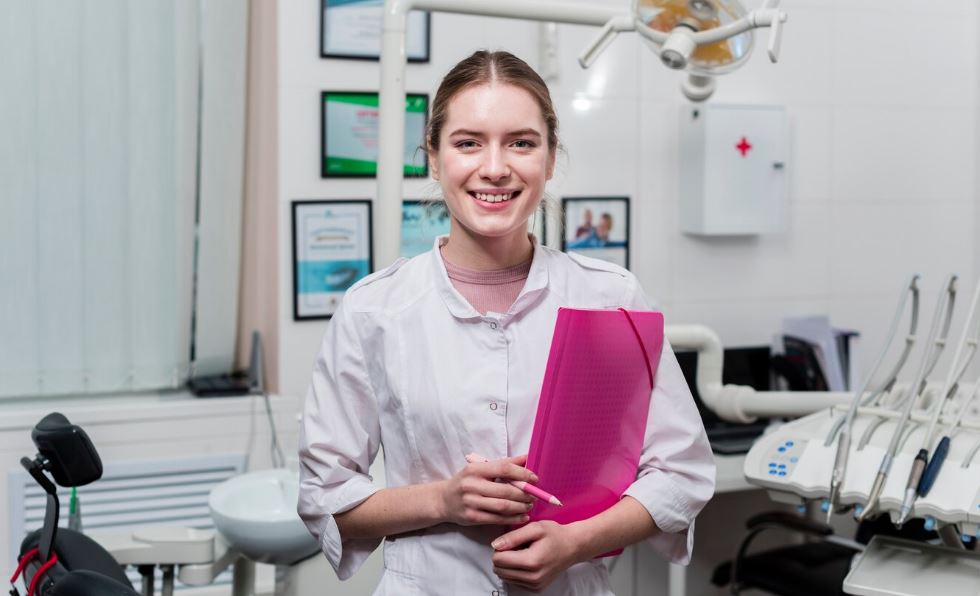
More than just a degree, a Bachelor of Dental Surgery (BDS) is a gateway to a profession that combines patient care, artistic expression, and medical science. Beyond just filling cavities, dentistry aims to improve general health, reduce pain, and boost self-esteem.
BDS students receive intensive training that equips them to identify, treat, and prevent oral diseases through a demanding yet incredibly rewarding curriculum. The program develops skilled professionals prepared to make a difference, from learning delicate surgical techniques to comprehending biomechanics and facial aesthetics.
Comprehensive Overview of the BDS Degree
| Category | Details |
|---|---|
| Degree Name | Bachelor of Dental Surgery (BDS) |
| Duration | 4-5 years (varies by country) |
| Key Subjects | Anatomy, Physiology, Prosthodontics, Orthodontics, Endodontics, Oral Surgery |
| Core Skills Acquired | Dental examinations, X-ray analysis, local anesthesia administration, surgical extractions, restorative procedures |
| Career Opportunities | Private dental practice, hospital-based surgery, public health dentistry, research, academia |
| Entry Requirements | High school diploma (Science stream), qualifying entrance exams (MDCAT, UCAT, NEET, etc.) |
| Expected Salary | Ranges from $50,000 to $200,000 per year, depending on experience and location |
Why Pick a Dental Surgery Bachelor’s Degree?
- A Special Combination of Art and Science In dentistry, creativity and precision coexist. Every dental restoration, including veneers and crowns, calls for a harmony between artistic vision and scientific understanding. BDS graduates work as medical professionals and specialists in aesthetics, making sure that every procedure restores both appearance and functionality.
- A Career in Great Demand Globally, oral health is now acknowledged as an essential component of total wellbeing. The need for qualified dental surgeons is greater than ever as more people look for advanced treatments, preventive care, and cosmetic enhancements. There are plenty of opportunities for BDS professionals, whether they work in rural healthcare facilities or big cities.
- Practical Clinical Education Real-world experience is emphasized in BDS programs. In addition to studying textbooks, students also work with real patients, become proficient with state-of-the-art equipment, and carry out complex procedures under the guidance of professionals. Upon graduation, this immersive learning approach guarantees competence and confidence.
Which Career Paths Are Open to a BDS Graduate?
Private Dental Office
Many graduates open their own clinics where they offer services like orthodontics, restorative dentistry, and cosmetic dentistry. This career path provides patient-centered care, financial stability, and entrepreneurial freedom.
Dentistry in Hospitals
Hospital-based positions enable BDS professionals to work on complex cases, trauma-related reconstructions, and maxillofacial surgeries for those who are interested in surgical interventions.
Community Dentistry and Public Health
With an emphasis on preventive care and oral hygiene awareness, dentists with a strong commitment to public service can work in government clinics, non-governmental organizations, or international health organizations.
Academic and Research Positions
Dental research is flourishing as a result of the development of biotechnology, regenerative dentistry, and AI-driven diagnostics. Graduates have the option to enroll in Master’s (MDS) or Ph.D. programs, which will help advance science and technology.
Inside the BDS Curriculum: What to Expect
| Year | Subjects & Specializations |
|---|---|
| Year 1 | General medical sciences (Anatomy, Physiology, Biochemistry) |
| Year 2 | Oral pathology, pharmacology, dental radiology, microbiology |
| Year 3 | Orthodontics, periodontology, conservative dentistry, oral medicine |
| Year 4 | Advanced oral surgery, prosthodontics, pediatric dentistry |
| Internship (if applicable) | Clinical rotations, hands-on surgical experience, patient management |
Overcoming Obstacles in Dentistry
- Accuracy Under Stress Every dental procedure needs to be done with extreme precision; even a millimeter can have a big impact. The answer? rigorous instruction, ongoing skill development, and cutting-edge diagnostic technologies like AI-based planning and digital impressions.
- Handling Anxiety in Patients For many people, a major obstacle to receiving treatment is their fear of the dentist. The answer? Advanced sedation techniques, painless methods, and a compassionate approach all contribute to a comfortable experience.
- Keeping Up with Quick Developments With advancements like teledentistry, laser-assisted procedures, and 3D-printed implants, the dental field is always changing. The answer? Attending workshops, putting new technologies into practice, and continuing education.
BDS vs. Other Medical Degrees: A Comparative Look
| Feature | BDS | MBBS (Medicine) | Pharmacy |
|---|---|---|---|
| Duration | 4-5 years | 5-6 years | 4 years |
| Hands-On Training | Extensive | Moderate | Limited |
| Earning Potential | High | Very High | Moderate |
| Job Demand | Consistently High | Extremely High | Moderate |
| Entrepreneurial Scope | Yes (Private Practice) | Limited | Limited |
| Further Specialization | Yes (Orthodontics, Prosthodontics, Endodontics, etc.) | Yes (Cardiology, Neurology, etc.) | Yes (Pharmacology, Clinical Research) |
Is a Bachelor of Dental Surgery a Good Career Choice?
Of course. Personal fulfillment, financial rewards, and job security are all provided by dentistry. BDS graduates have a great chance to prosper because of the rapidly increasing demand for restorative and aesthetic procedures.
Why BDS is a top career choice:
✅ High earning potential and career flexibility
✅ Global demand for skilled dental surgeons
✅ Opportunity to specialize in high-income fields like cosmetic and implant dentistry
✅ A balance of medical expertise, artistry, and patient interaction
For those passionate about healthcare, technology, and patient care, a BDS degree is a powerful stepping stone to a fulfilling career.
Dentistry’s Future: Developments and Advancements
With ground-breaking developments in robotics, regenerative medicine, and AI-driven diagnostics, the field of dentistry is changing quickly. Nano-dentistry, virtual treatment simulations, and minimally invasive procedures are examples of cutting-edge technologies that are revolutionizing patient experiences and treatment results.
The future appears to be very promising for those who want to become dentists. There are countless opportunities for advancement and creativity in dentistry, whether in private practice, research, or specialized surgery.
A Bachelor of Dental Surgery is the ideal course for you if you see a future in which technology and science coexist, art and medicine are combined, and patient care changes people’s lives.
